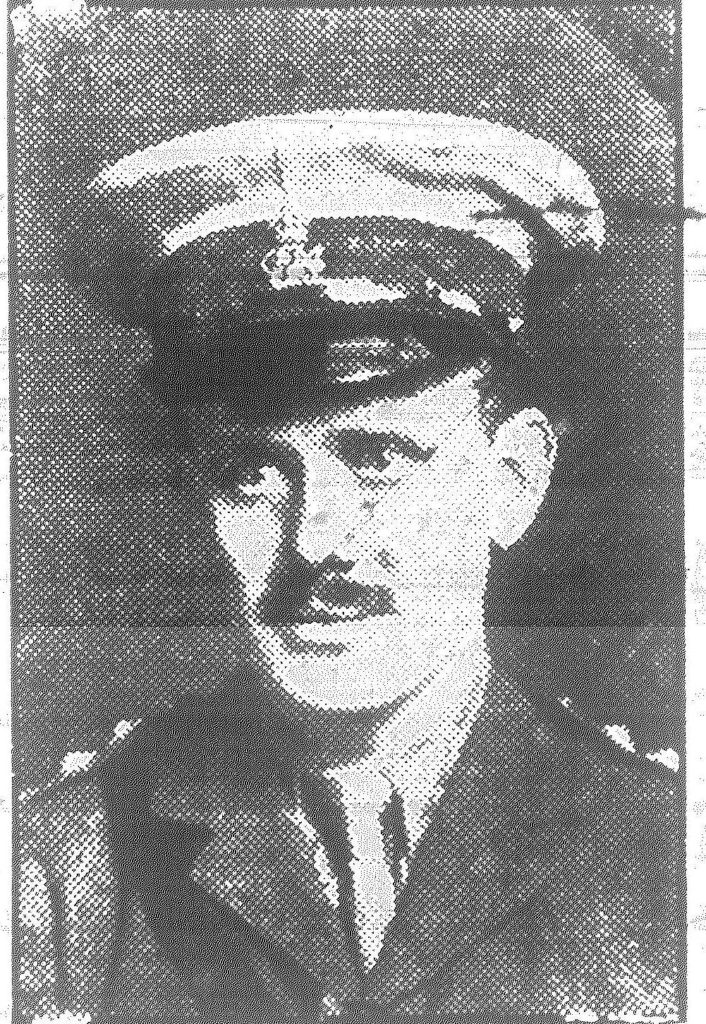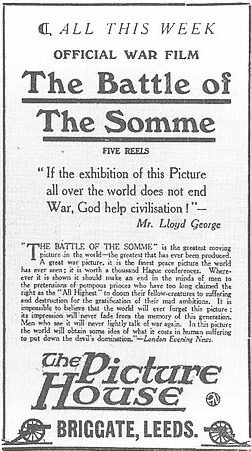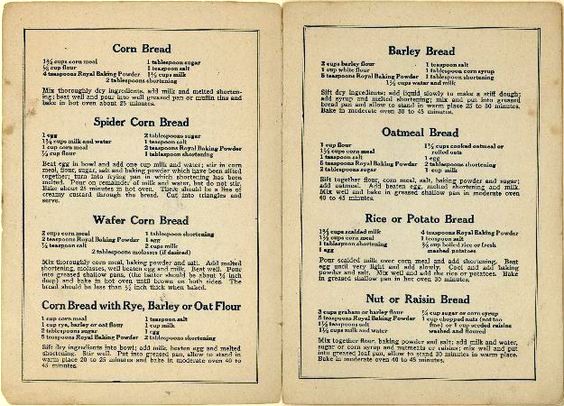BERWICK ADVERTISER, 25 JANUARY 1918
War News
MILITARY CROSS FOR K.O.S.B. OFFICER
Second Lieutenant A. McCall
Second Lieutenant A. McCall, K.O.S.B. who was wounded on 31st July, near Ypres, and subsequently died in hospital in France, was awarded the Military Cross. The following is the official account of the act of gallantry for which the decoration was awarded:-
For conspicuous gallantry and devotion to duty. When all the other officers of his company had become casualties, he took command and led them with the greatest gallantry and skill during the severe fighting which ensued, returning after the capture of each strong point and collecting more men, whom he led forward. While doing this gallant work, he fell severely wounded in the head, having materially assisted in the capture of the position.
Lieut. McCall was the elder son of Hon. Sheriff-Substitute M. McCall, British Linen Bank House. He obtained his commission in the K.O.S.B., in June, 1916, and went to France in April of last year.
The Military Cross was recently presented to Sheriff Mccall, as next-of-kin to the late Lieut, MCCall, by Colonel Maclaren of the K.O.S.B., at Berwick.
NEW REPORTED PRISONER
Private W. J. Dalgleish
The anxiously awaited news reached Mrs Dalgleish, West End, Tweedmouth, last Thursday that her husband, Private Wm. Joseph Dalglesih, N.F., who was reported in December to have been missing since 26th October, is now stated to be a prisoner of war in Germany. Private Dalgleish joined up at Alnwick on 16th June, 1915, and proceeded in to France in Nov. 1916. We trust that he will return safe and well to his native town, when the war is over.
LOCAL NEWS
Large queues outside the grocers’ shops were distressing sight in Berwick on Saturday. A drenching rain was falling during the greater part of the day and the miserable conditions were intensified by the unfortunate people having to stand ankle deep in snow slush. So bad were the conditions that in two instances women through exposure and excitement fainted and had to receive attention.
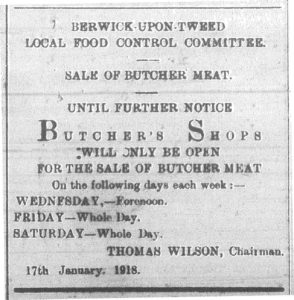
Fair supplies of bacon were to be had in some of the shops while margarine which had been scarce commodity during the greater part of the day, was in better supply in the evening, a consignment having arrived late in the afternoon. It is to be sincerely hoped that sights like that of Saturday will never again be allowed to take place, and they could be prevented if a system of equal rationing, not only of butter, margarine, bacon, tea and cheese, but of butcher meat, was immediately introduced. The situation demands immediate and drastic action, but it should not be out with the power of the local Food Control Committee to grapple with the problem quickly and effectively.
Former pupils of the Berwick Grammar School will be pleased to know that Mr Jones (who acted as a modern language master from 1907 to 1913) is still in the pink after two years’ service with the Royal Engineers in France. Mr J. N. Peace, B.A., junior master, is still on active service and feeling fit. We are sure that the “Old Boy’s” will wish them both continued good luck. No less than fifty copies of the School Magazine were sent by the pupils to former pupils at the front last year.
The sudden thaw after the phenomenal spell of frost has produced a scene on the River Tweed which has not been equalled for many years. Ice and snow piles which had gathered on the floes were on the evening tide of Sunday night, being swept to sea by the swollen stream, in considerable quantities. On Monday forenoon the sight presented to the onlooker was not likely soon to be forgotten, and more closely resembled an arctic scene than anything else. As far as the eye could reach a mixture of pack ice, snow and tree trunks was spread over the surface of the river.
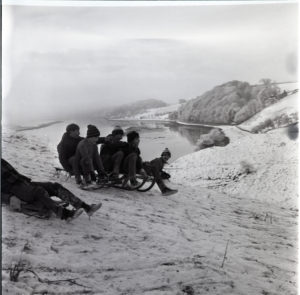
About ten thirty, fishermen on the Quay observed a large tree root being carried down to the sea. Running backwards and forwards and evidently alarmed at their plight two rabbits were seen. The poor creatures had evidently been foraging for food on the tree trunk when it broke away further up the river. The state of the river made it impossible for boatmen to attempt then capture and it is possible that the luckless bunnies would meet a sailor’s end in the choppy waters at the harbour mouth. At the mouth of the river the ice pack presented an almost unparalleled sight when meeting with the breakers rolling over the bar. As each succeeding sea rolling in it met the ever increasing volume of ice and water and an almost straight wall of water was set up, just as one party remarked “like the Red Sea when the Israelites passed through.” The grinding and crashing of the ice was heard for a considerable way from the riverside.
A very pretty and quiet wedding took place in Wallace Green Church on Monday 21st inst the contracting parties being Sergt J. R. Young, R. F. C., eldest son of Mr and Mrs George Young, Christon Bank, and Mary eldest daughter of James MacNab, J. P. and Mrs Macnab, Station House, Tweedmouth. The ceremony was conducted by Rev. J. Macaskill, M. A., minister. The bride was given away by her father and had her sister Miss L. MacNab and Miss Young for maids.
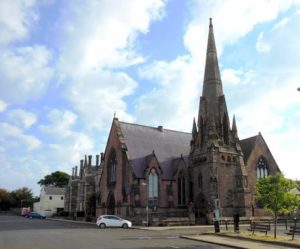
The groomsmen were Cpl C. Johnstone N.H., cousin of bridegroom, just home from France the same morning, who has twice been taken prisoner by the Germans, and Mr Williams of North Shields. The bride was dressed in grey Gaba dine trimmed with mole stole and hat to match, the maids wore mole coloured coat frocks and black silk hats. The happy couple left for Retford by 6.40pm Express, where Sergt Young is at present stationed he having been sent back to this country for duty after nearly three years in France. Another brother of Sergt Young is in Italy also in the R.F.C. Both families have given of their best for our Country’s cause. The bride’s travelling dress was of navy blue. At the close of the wedding a reception was held at the home of the bride’s father.


